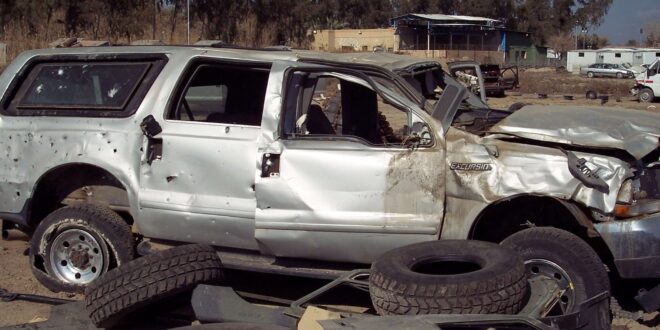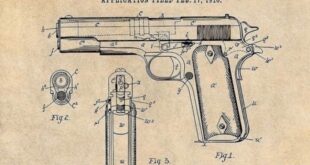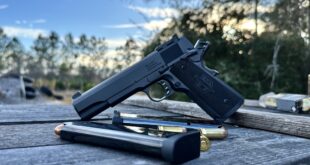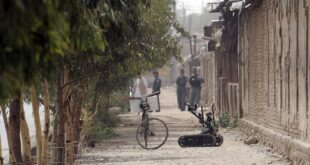by Mikial
The author tells Soldier of Fortune: “All of my work was with Department of Defense contractors. We never considered ourselves mercenaries although we were called mercenaries, gunslingers, and worse at times. It was difficult and dangerous work and also sometimes boring. We often lived rough in camps and slept in our vehicles. I was shot at with small arms and RPGs, took cover from mortars, had my vehicle targeted three times by IEDs, was in a high-speed traffic accident, and suffered food poisoning. Several teammates, and in some cases people I was in charge of were killed and wounded. I saw other people I knew completely screwed over by their employers who had skipped the country and left them stranded and unpaid. The money was good, but more importantly, I was proud that I was serving my country and protecting innocent American lives.” Here is his story. ~SKK
It was a typical mid-August day in the desert back in 2004 as we arrived at Trebil, the border post between Jordan and Iraq. We’d just made the 200-mile drive from Amman. We were supposed to have flown into Baghdad, but insurgents were shooting at planes trying to land at Baghdad International Airport, so flights were suspended.
READ MORE about life as a contractor in Iraq
The border crossing was crowded with locals trying to go in one direction or the other. We didn’t have any visible weapons or equipment, and could have been mistaken for tourists. Eventually, some American troops stationed at the crossing told us we were at the civilian gate and needed to move a few hundred yards to what passed for a military gate. We dragged our gear across the sand to where we settled into a deserted Iraqi border police building, and waited.
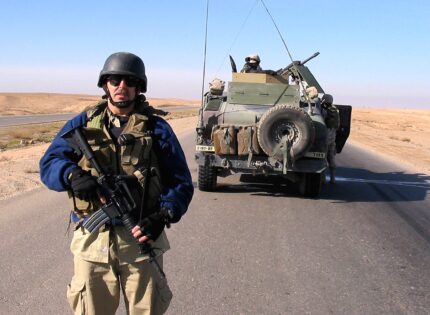
The author takes a break on the road to Mosul.
After a couple of hours, the team sent by our employer arrived to pick us up. They gave us a quick security briefing and handed out AKs and body armor. Then the seven of us loaded up into soft-skinned Suburbans for the drive to Baghdad.
We made the 300-mile “Desert Dash” in around six hours, stopping once on an overpass where we had a clear field of view to piss by the roadside. We arrived at our ‘camp’ in the early evening. It was actually some houses on the Radwaniyah side of BIAP (Baghdad International Airport). Supposedly they’d been holiday residences of Saddam’s Ba’ath Party cronies. They were abandoned, so the company had just moved into a few.
So ended my first day as a private security contractor in Iraq. The next 2½ years would be more eventful, but it was a start.
The Life of a Contractor
What most people who have never done high-risk security contracting don’t understand is what a Charlie Foxtrot it can be. In 2004 Iraq was pretty much the Wild West. “Logistics” folks were given a bag of cash to go out into the city and locally source everything from weapons to spare Suburbans.
I’d spent 12 years in the US military, and gone from an E-1 to an Armor Captain. I’d done a lot of tough training, including four years at the National Training Center. The deep desert was nothing new to me.
But all that training seemed to have been for nothing since I’d never been in the right unit at the right time to deploy to war. I felt like a trained ER nurse who’d never worked in an ER. So when the chance to do private security work in Iraq came along, I didn’t hesitate.
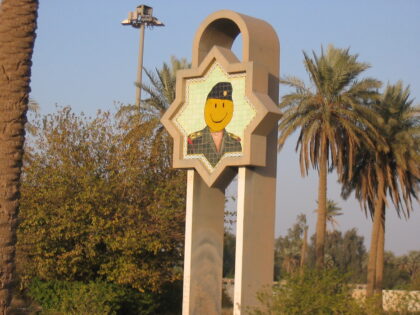
Saddam’s face was everywhere. Some troops thought this would be an improvement.
Charlie Foxtrot
The first company I was contracted with was a new start-up some Brit (we all just referred to him as The Brit) had formed to cash in on the Iraq security gold rush. He recruited some US and British veterans, along with a raft of Gurkhas from Nepal, and landed himself a multi-million dollar contract with an American DoD reconstruction contractor.
The company ran on a shoestring. They issued body armor and well-used AKs along with a few old pistols. We provided the rest of our own equipment. Their contract stipulated that up-armored SUVs were supposed to escort the B6 armored SUVs the principals rode in, but all we ever had were soft-skin Suburbans.
Our job was to act as a Personal Security Detail for Western engineers and construction managers. The IEDs weren’t as prevalent in 2004 as they would later become.
My vehicle was only targeted by an IED once on that contract. The Iraqi pushing the button had bad timing, so most of the blast hit a bus full of Iraqi civilians. Mostly we got shot at.
One guy, Tony, a former Royal Marine who’d fought in the Falklands War, had his nose shot off by an AK round. He was one hard dude and didn’t react until he’d emptied his magazine in the bad guys’ direction.
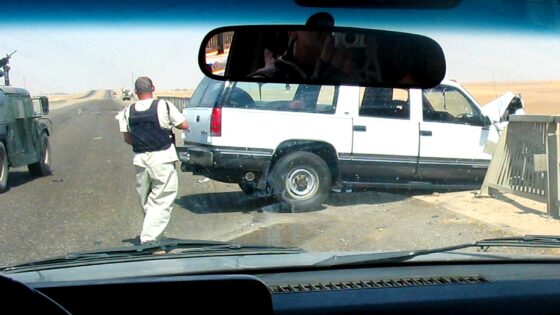
We hit an Iraqi truck at 75 mph near Samara. All personnel and equipment were transferred and back on the road just minutes after the crash.
The bad guys were a risk, but the Iraqi drivers were more of one. At one point we crashed a Suburban at 75 mph when an Iraqi truck cut us off. The SUV was totaled and we barely escaped plunging off an overpass. Aside from one guy who got a concussion, we were all fine despite the fact no one was wearing seat belts. The guy who ended up with the concussion was carrying an old Sterling SMG he’d picked up somewhere. I remember thinking that I hoped he had it pointed somewhere beside at me as our gear came crashing forward during the wreck.
The company lost its contract after a few months. The guys on the teams were solid, but the company wasn’t fulfilling its contractual obligations for vehicles and proper equipment. They promised us all they’d get another contract and everyone spent a week sitting around and drinking beer.
But one night The Brit and his number two guy bailed on us. They just caught a plane out of the country and left everyone sitting there in the abandoned buildings. I was lucky and got out of the country quickly. The Gurkhas were just left high and dry.
I got another contract a couple of weeks later, and some of the guys I knew from the old company showed up at our camp trying to sell weapons and vehicles to get money for tickets home. Moral of the story…make sure whoever you sign up with is legit.
Abu Ghraib and Weapons Convoys
My second contract was escorting high-value convoys for Custer Battles. Convoys with sensitive items like weapons, ammo, medical supplies, and equipment the USG was giving to the Iraqi security forces. We worked out of a big warehouse complex in Abu Ghraib. Every insurgent within a hundred miles knew where it was and when a convoy went out.
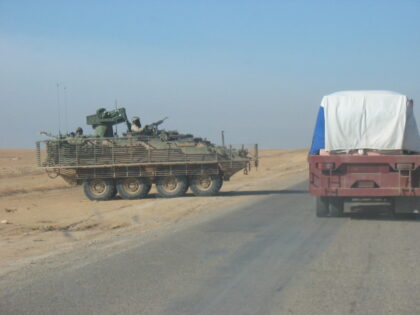
A Stryker joins the convoy as an escort in Northern Iraq. The extra firepower was a welcome sight.
When you do PSD work, getting the principal(s) to safety is the number one priority. If you’re ambushed, the team does everything possible to get the client away. Things are different when you’re escorting trucks loaded with weapons. The insurgents know that all they have to do is disable a truck and the escort has no choice but to stay there and protect them. No way could we leave a truckload of weapons for the insurgents to grab.
We ran in up-armored F350 trucks with machine guns mounted in the back and shooters in the cab’s back seat. A team consisted of four trucks. We sometimes had U.S. Army escorts traveling with us in HUMVEES or Strykers. We traveled to Iraqi bases all over the country from the Turkish and Syrian borders to Um Qasr on the Kuwaiti border.
One time they’d shot a truck driver and disabled a couple of trucks. The team was receiving heavy fire from some bombed-out buildings. A couple of the military escort HUMVEES opened up with .50 cals. It shut the incoming fire down, but it was a little unnerving having .50 caliber tracers zinging over your head.
We were attacked with IEDs, small arms, and even VBIEDs. One team detonated a car bomb as it raced toward them on an entrance ramp by shooting it up. My vehicle was targeted three times by IEDs that missed. Mostly. We were lucky, they didn’t get good with their IEDs until around 2006.
The last device was planted above the highway pointing down from an overpass. It was detonated as we went under it. Most of the blast missed us and hit a local pickup truck. Even so, my Kurdish PKM gunner in the back took some splinters in the leg.
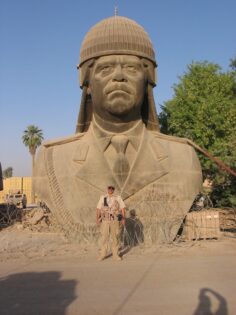
The author and one of the giant statues to Saddam’s ego that used to be on his palace roof. The palace was converted into the US Embassy.
Each vehicle crew consisted of an American commander, two to three Kurdish shooters, and often a Lebanese who was both a skilled team member and an interpreter. Everyone went by call signs. I don’t think any of us knew most people’s real names. The Lebanese on my truck went by Casper.
Casper was a former Lebanese Christian militiaman, he had a lot of experience in city fighting during the Lebanese civil war. His front teeth were a different color from the rest, and one day I asked him what the deal was. He told me they were fake. He’d been captured by the Syrians in Beirut when he was 16. They’d smashed his front teeth out with a rifle butt. But he’d escaped by jumping out a second-story window and made his way back across the city into militia territory.
Casper didn’t have a dimmer switch. We stopped for lunch in a relatively safe area one day and all the local truck drivers sat around on the ground scooping up rice and lamb with their fingers. When it was time to go, we sent one of the Kurds to tell the drivers to mount up. He left his AK in the truck. When he didn’t come back after 10 minutes we went looking for him.
Iraqi Arabs and Kurds don’t like each other. We heard shouting and looked under one of the trailers and saw a cluster of feet. The Iraqi drivers had our Kurd surrounded and were yelling and pushing him around. Before we could say anything, Casper drew his Glock from his vest and walked into the crowd. Casper wasn’t a big guy, but he went straight for the biggest Iraqi. He put the muzzle of the gun against the guy’s head and started yelling at him in Arabic, banging the muzzle against his head with every word. The Iraqis broke in all directions. Casper holstered his pistol like nothing had happened. We all just looked at each other and shrugged. Just another day in Iraq.
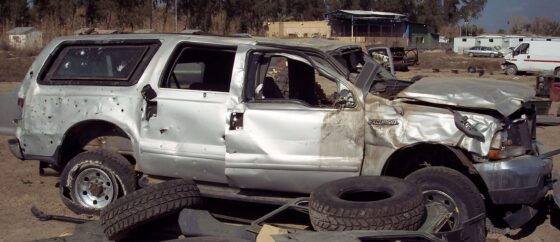
One of our B6 armored SUVs that was targeted by a VBIED. It flipped the SUV onto its roof but everyone walked away.
One of the tensest moments I had wasn’t a face-off with insurgents, but with the Iraqi police. We were going to the port in Um Qasr to pick up our convoy when we were stopped by a large group of police at a checkpoint. They were angry but we had no idea what was up and only found out later that they’d had an exchange of fire with another escort team earlier that day. Team vehicles and crews all looked alike to them so they assumed we were the same guys.
As the Iraqis began pointing guns at us, all our Kurds dismounted and pointed theirs right back. Nobody can ever say that Kurds aren’t always ready for a fight. I got out of the cab with my M4 and got in position behind the open door since it had armor in it. I remember hearing “click, click, click, click” as the Kurds took their safeties off and thinking to myself, “Oh, this is gonna suck.”
Fortunately, our two Lebanese guys sorted it all out and we went on our way. It wasn’t until later that we found out what had happened to cause the whole thing.
Convoy escort was tough work. A month after I finished that contract one of the teams got ambushed. A friend of mine was shot in the neck and killed. In all, the group had six expats and at least that many Kurds killed in a year’s time.
Hitting the Big Time
I hit the big time on my third gig in Iraq. I landed a position as the country security manager for a big reconstruction contractor. I still went out on the road, but I spent most of my time working with our security subcontractors and Iraqi security forces to protect our project sites and move our people around. I got to spend a lot of time with the locals and Iraqi police. I even got to work with the commanding general of the Iraqi 13th Infantry Division.
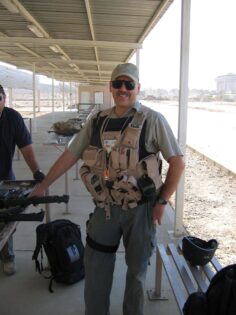
On the range at the Iraqi Police Academy in Baghdad in 2006. The academy was bombed several times over the years.
After 2½ years I left Iraq and started doing security work all over the world. I made another trip to Iraq and three trips to Afghanistan. I also worked in Pakistan, Jordan, Kenya, the West Bank, and Israel. I was on a security assignment in Cairo during the riots when Mubarak was overthrown.
My War
The gold rush days of Iraq and Afghanistan are over. The demand for high-risk security contractors has died down. I feel like I got into the game at the perfect time.
There are still opportunities for veterans who want to get back into the mix. Close protection and personal security specialists are a hot commodity in Africa, Latin America, and Asia. But the Wild West flavor of the early 2000’s is a thing of the past.
I’m glad I got the opportunities I did and got to work with some great people. There were times the Army guys didn’t like us and called us mercenaries and gunslingers, but we didn’t care. We knew the job we did was dangerous and important and I’m glad I finally got to go to war. It may not have been the balls-to-the-wall tank combat I trained for, but as General Patton said, it was better than shoveling shit in Louisiana.
Mikial is a U.S. Army veteran. After leaving the Army, he spent 15 years as an international security contractor which included 2½ years in Iraq as well as assignments in Afghanistan, Pakistan, Jordan, Israel, the Palestinian West Bank, Kenya, and Cairo. He’s retired now and lives in the country with his wife where he enjoys writing, shooting, going to metal concerts, and playing video games.
 Soldier of Fortune Magazine The Journal of Professional Adventurers
Soldier of Fortune Magazine The Journal of Professional Adventurers


